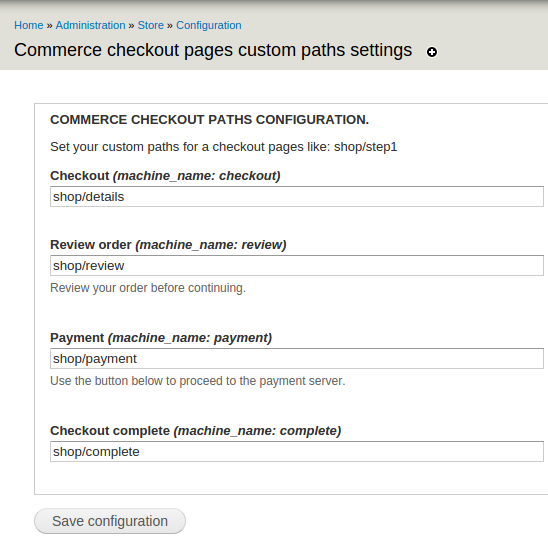I to went that road, did not want customers to see an on each order incrementing ID in URL's. In hook_url_outbound_alter() any path can be encrypted by altering the regular expression.
/**
* Implements hook_url_inbound_alter().
*/
function mymodule_url_inbound_alter(&$path, $original_path, $path_language) {
// Decrypt paths that are encrypted by our hook_url_outbound_alter() to hide possible id's in paths.
if (preg_match('#^ENC:(.+)#', $path, $m)) {
$path = _mymodule_mcrypt('decrypt', $m[1]);
}
}
/**
* Implements hook_url_outbound_alter().
*/
function mymodule_url_outbound_alter(&$path, &$options, $original_path) {
// To hide id's in paths, we encrypt them.
if (preg_match('#^checkout/.*#', $path, $m)) {
$path = 'ENC:' . _mymodule_mcrypt('encrypt', $path);
}
}
/**
* Helper function to encrypt and decrypt strings, ie. paths to hide containing id's.
* NB: We replace forward slashes for exclamation marks, otherwise trailing
* slashes in the URL will be ignored by Drupal.
*/
function _mymodule_mcrypt($action, $string, $key = null) {
if (!$key) {
$key = $GLOBALS['drupal_hash_salt'];
}
$mcrypt_method = MCRYPT_RIJNDAEL_128;
$iv_size = mcrypt_get_iv_size($mcrypt_method, MCRYPT_MODE_CBC);
// Make key exactly as long as long as $iv_size.
$key = substr(str_repeat($key, CEIL($iv_size / strlen($key))), 0, $iv_size);
if ($action == 'encrypt') {
$iv = mcrypt_create_iv($iv_size, MCRYPT_RAND);
$encrypted_string = base64_encode($iv . mcrypt_encrypt($mcrypt_method, $key, $string, MCRYPT_MODE_CBC, $iv));
return preg_replace('#/#', '!', $encrypted_string);
}
elseif ($action == 'decrypt') {
$decrypted_string = base64_decode(preg_replace('#!#', '/', $string));
$iv = substr($decrypted_string, 0, $iv_size);
$decrypted_string = substr($decrypted_string, $iv_size);
return rtrim(mcrypt_decrypt($mcrypt_method, $key, $decrypted_string, MCRYPT_MODE_CBC, $iv));
}
return false;
}

